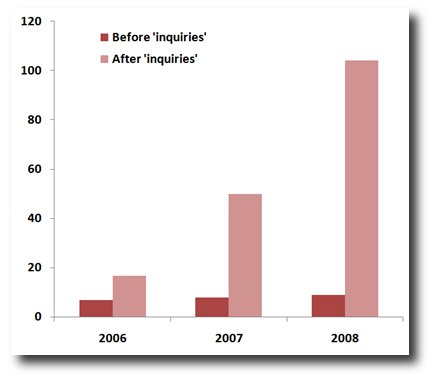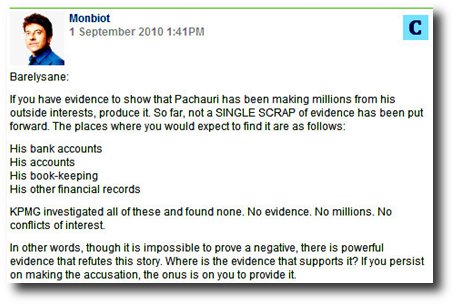This is a guest post by Julian Williams and Shub Niggurath
Background
Last November things began to go seriously wrong for the IPCC version of science. Things started after a leading Indian glaciologist called VK Raina publicly pointed out that he disagreed with the IPCC conclusion that the Himalayan glaciers would melt away within 30 years. Raina said studies showed that at the present rate of melting, the glaciers would take hundreds of years to do so. The Indian public had previously been told that the waters from the Himalayas would dry up within their lifetimes, so this good news was published on the front pages of the Indian newspapers.
Dr Rajendra Pachauri, using his title as the chairman of IPCC, reacted strongly against the good news and told the press there were no errors in the conclusions of the IPCC AR4 report. He told the press that VK Raina's conclusions were based on “voodoo science”, and that his opinions were not worth listening to. Questions were raised by observers, who couldn’t help noticing the strong reactions from the IPCC chairman, at the cost of addressing the errors themselves.
Pachauri’s crude attempts did not work and within days VK Raina found himself being interviewed by the Indian media alongside a very political Englishman who was not a glaciologist. Whether Raina appreciated Dr Richard North’s intervention I do not know, but certainly North had a different style about how to confront the smearing of Raina’s reputation by the chairman of the IPCC.
By that time, the error had been tracked back to a glaciologist called Syed Hasnain. Through a simple error, a rumour had developed that the glaciers would be gone within 40 years and the IPCC had published this story as part of its conclusions. Hasnain admitted to the press that there was an error in the IPCC report.
Eventually Pachauri had to acknowledge the IPCC’s error but the record in the assessment report (AR4) was never corrected, and remains incorrect to date.
One under-reported aspect of this scandal was the fact that Pachauri had a charity called TERI, which was poised to benefit from millions of euros and hundreds of thousands of dollars set aside to study the melting of the Himalayan glaciers. It turned out that TERI had used the IPCC’s very prediction of glacier doom in asking for funds. It also turned out that Hasnain was at work at TERI studying Himalayan glacier melt. It also turned out that Hasnain already knew about about the exaggerations in the IPCC report. The Sunday Telegraph became the venue where Richard North, who had uncovered major portions of this story, published these stories. Perhaps, as a result of this exposure, the Carnegie Corporation of New York decided to release no further funds to TERI.
On his blog, North asked obvious questions about the conflict of interest of one person being responsible for overseeing the writing of IPCC reports without error and running a charity which received money to study the conclusions of the IPCC reports. Was he tardy in responding because TERI’s glaciology team studied the same problem of catastrophic melt and therefore he assumed the problem to be genuine? North also raised questions about the accounts of TERI-Europe which is a charity run by Dr Pachauri from a suburban house in South London.
For the IPCC, there was more to come. Another claim that failed the test was that peer-reviewed scientific research had concluded that a small change in rainfall would decimate the Amazon tropical rainforests. North revealed this claim was gleaned from unsubstantiated gray literature put out by green advocacy groups. The scandal, which was published in the Sunday Times, became known as Amazongate.
By then of course, the public trust in climate science had taken a further severe knock after the leaking of the CRU Climategate emails. These emails showed how an inner circle of climate scientists had tampered with the proxy temperature records to “hide the decline”, hidden their raw data from other scientists and statisticians and perverted the conventions of peer review.
The Monbiot counter-attack
Following Climategate, Glaciergate, Amazongate and North’s articles about Pachauri, Monbiot was finding it harder to sell his messianic scare stories and views to a sceptical public. The two crutches on which he had always relied to convince his fans — the conclusions of IPCC reports and peer-reviewed papers written by climate scientists — no longer worked like they had in the past.
Certainly, someone had to be blamed.
Monbiot saw an opportunity to strike at North after the Sunday Times withdrew the Amazongate story. He saw the retraction as a green light, writing two successive pieces at the Guardian, accusing North of “peddling inaccuracy, misrepresentation and falsehood” in the first. North only showed that things were worse — the IPCC statement had been harvested from a defunct Brazilian website. North considered Monbiot’s accusations to be libelous and lawyers were called in to sort out the mess. Monbiot had to admit he had unfairly attacked North and give him space on his column for a reply. (Dr North’s complaints about Monbiot are still awaiting adjudication by the Press Commission).
The next opportunity arose for Monbiot when the Sunday Telegraph retracted its article and apologised for suggesting that Pachauri was corrupt. The retraction occurred after Pachauri undertook libel action against the paper. In the piece, Booker and North questioned the IPCC boss who donned several hats, working on the boards of several corporations that benefitted from business action against climate change.
Monbiot repeated the same strategy writing two more articles attacking North for “smearing” the reputation of Dr Pachauri. Perhaps he had not paused to notice, as with Amazongate, that the retracted Telegraph article neither referred to Pachauri’s conflicts of interest nor questions raised about TERI-Europe’s accounts.
Nevertheless for Monbiot, just as a newspaper retraction vindicated the IPCC earlier, another newspaper retraction, under threat of libel action seemed to absolve the IPCC chairman of all lapses. The caveat-laced, ‘limited review’ of Pachauri’s personal accounts in India, by a private corporation KPMG, which relied on information provided by him, seemed enough for Monbiot.
The second of the two articles defending Pachauri was titled: “Press continue to hound Rajendra Pachauri despite his innocence”. Members of the public were quick to use the comments forum on Monbiot’s blog to challenge his portrayal of Pachauri as a man who had been smeared by Dr North. Addressing one commenter, Monbiot wrote in his own comments section:
More than just smears
I responded with an open letter to George Monbiot asking him to explain his position more clearly. I wanted to know why Pachauri thought VK Raina’s report was “voodoo science”. Was he simply ignorant that the 2035 date in the AR4 report was incorrect and none of his team of experts in glaciology had alerted him to the error? Was not TERI using public funding from the EU, to study the same claim? Wasn’t Monbiot bothered by this? Why did he persist in giving Pachauri the benefit of the doubt? The letter was removed soon after I posted it.
Further comments were being deleted as well; but I was not willing to give up. I repeatedly asked for Monbiot to comment on why Pachauri made his “voodoo science” smear. I asked whether it was unreasonable to inquire if it had anything to do with TERI being funded to study the very "2035" glacier melting claim.
Monbiot never responded. As before however, there was more to come.
The UK Charity Commission made available TERI-Europe’s published and revised accounts. I presented them to Monbiot.
|
Year |
Income as submitted before inquiries |
Corrected figures submitted after inquiries |
|
2006 |
7,000 |
16,610 |
|
2007 |
9,000 |
49,878 |
|
2008 |
8,000 |
103,980 |
|
TOTAL |
24,000 |
170,468 |
Ritu Kumar, TERI’s director at London was compelled to revise their accounts, following the Telegraph’s inquiries into its dealings. The differences were astounding. What the new accounts showed was that, for three years running (the period shown above), TERI-Europe had grossly under-declared the income of the charity. It did not have any known subsidiaries. This was the same period TERI-Europe obtained DEFRA public funds, just for the IPCC synthesis report alone, an amount almost twice what it declared on the books.
In the period shown, only 15% of their income had been put through the charity’s accounts and 85% of TERI-Europe’s income had simply not been included in their declared income. Their complete accounts have not been submitted to date.
 TERI-Europe Income reported to the Charity Commission UK
TERI-Europe Income reported to the Charity Commission UK
Monbiot asked visitors to his Guardian thread to come up with evidence of Dr Pachauri’s unreliable bookkeeping. He must have thought this impossible. The one account unable to be veiled from public scrutiny was Pachauri’s TERI-Europe’s and that had 85% of income missing from the books until prodded. I provided Monbiot with what he asked for.
Monbiot declared Pachauri's personal accounts and financial practices were shown by KPMG as being clean. In the light of the above however, Monbiot's unquestioning confidence in such conclusions were puzzling.
About midday the inconvenient evidence that I provided at the Guardian forum, along with discussions of that evidence with aghast Monbiot fans were removed from the thread. The thread was closed down.
Every single comment about the accounts was removed.
The new Monbiot
It was always faintly funny that the Monbiot should accuse Richard North of ‘smearing Pachauri’. We saw that Monbiot’s harmless IPCC-inspired pushing of the party line had shallow foundations that would one day be swept away by the growing awareness of the public. But we should revise that opinion. It is one thing to put forward one own points of view and cite half-truths as evidence; it is quite another to tamper with and remove facts from the public record to support an argument that does not stand up. To call for evidence and then hide is both hypocritical and paradoxical. Monbiot should be asking questions and releasing evidence, not covering it up to protect public figures like Pachauri. One wonders how long this charade will last.
